人教版八年级英语下册Unit9课件
合集下载
Unit9 sectionA重要知识点讲解课件人教版八年级英语下册
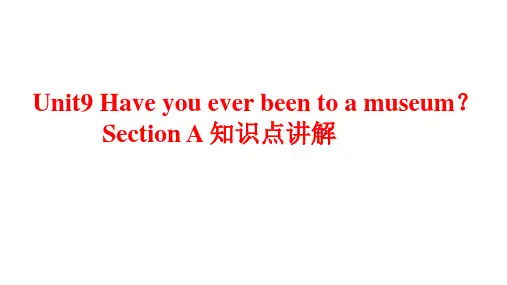
若前一句用分号,则so 不用大写第一个字母,而且so 前也无 须加and,同样构成并列句。
Jennifer likes to listen to music; so do I.
10.“so + 主语+动词”,这一结构用来表示对上文情况给 予进一步的肯定或确认。
---It was cold yesterday.昨天很冷。 ---So it was.确实是这样。
--- The students study hard.学生们学习很努力。 ---So they do.他们确实很努力。
--- He went to Shanghai yesterday.他昨天去北京了。 ---So he did.他确实去了。
1.— Have you ______ been to Xiamen? — No, ___A_____.
使用这一结构应注意以下几点: 一、注意结构中and 与标点符号的使用。 这一结构是一个完整的倒装句,因此,若前一句用句号,则so 应大写第一个字母。
Jennifer likes to listen to music. So do I.
若前一句用逗号,则so 前须加and,构成并列分句; Jennifer likes to listen to music, and so do I.
当前面的陈述句中有否定词few, little, never, no, nobody, hardly, seldom等词时,其后的简短疑问句应用肯定形式。 He can hardly swim, __ca_n__h_e_?
We have a little water, _d_o__w_e__?
以let’s开头的反义疑问句,简短疑问句部分用shall we;以let us 开头的反义疑问句,简短疑问部分用will you.
Jennifer likes to listen to music; so do I.
10.“so + 主语+动词”,这一结构用来表示对上文情况给 予进一步的肯定或确认。
---It was cold yesterday.昨天很冷。 ---So it was.确实是这样。
--- The students study hard.学生们学习很努力。 ---So they do.他们确实很努力。
--- He went to Shanghai yesterday.他昨天去北京了。 ---So he did.他确实去了。
1.— Have you ______ been to Xiamen? — No, ___A_____.
使用这一结构应注意以下几点: 一、注意结构中and 与标点符号的使用。 这一结构是一个完整的倒装句,因此,若前一句用句号,则so 应大写第一个字母。
Jennifer likes to listen to music. So do I.
若前一句用逗号,则so 前须加and,构成并列分句; Jennifer likes to listen to music, and so do I.
当前面的陈述句中有否定词few, little, never, no, nobody, hardly, seldom等词时,其后的简短疑问句应用肯定形式。 He can hardly swim, __ca_n__h_e_?
We have a little water, _d_o__w_e__?
以let’s开头的反义疑问句,简短疑问句部分用shall we;以let us 开头的反义疑问句,简短疑问部分用will you.
Unit9Haveyoueverbeentoamuseum_SectionA1a-2c课件人教版英语
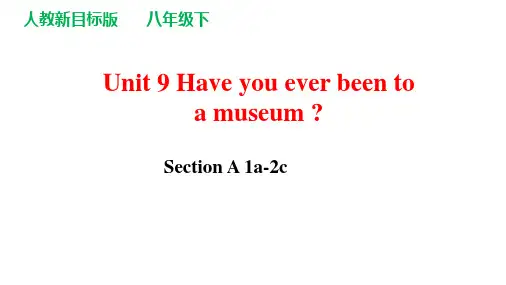
Free talk Have you ever been to a/an_...? Yes, I have. /No, I haven’t.
have been to (去过),可 以与never[从没], ever [曾经], just[刚刚], once [一次], before[之前]连接。
ahsnmsciapsiawetutaruonscatrrecetmeymemrmzumeopusnuuoeastsuserepeumkuuammrmk
“我也是”结构: So+助动词/情态动词/be+主语(肯定) “So+助动词/be动词/情态动词+主语I.”=Me,too.
Drills --I have ever been to _a_s_c_i_en__ce__m__u_se_u_m___.
Have you ever been there?
回答1:Yes, __I_h_a_v_e___.
➢ 拓展:表示后者与前者情形相同,即“……也不……”时, 常用Me neither.或neither/nor引起的倒装句: Neither/Nor+助动词/系动词be/情态动词+主语.
时态上与前文保持一致,数要与其后的主语一致。
例:—I have never been to a water park.
Look at the map of the town. Listen and circle the places you hear.
2b Listen again and circle T for true or F for false.
Conversation 1
1. Tina went to the space museum last year. T/F
2021年中考重庆专用英语人教版教材复习八年级下册Units 9-10课件
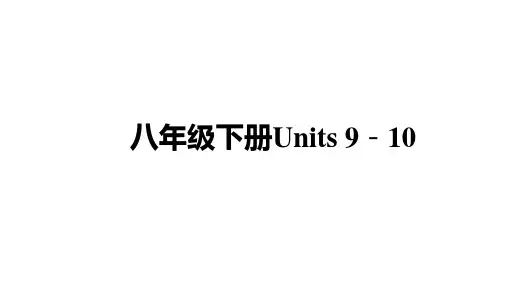
Whatever you do,do it well. =No matter what you do,do it well. 无论你做什么,都要把它做好。 Whoever you are,you must keep the law. =No matter who you are,you must keep the law. 不管你是谁,你都要遵纪守法。
八年级下册Units 9-10
1
考点梳理 过重难点
2
课堂达标 高校提能
3
语法突破 精讲精练
考点梳理 过重难点
考点1 Have you ever been to a science museum? 你曾经去过科学博物馆吗?(Unit 9 P65) 【辨析】 have/has been to,have/has gone to与have/has been in
学以致用
( C )1.—Do you know him well?
—Sure.We ______ friends since ten years ago.
A.were B.Made
C.have been D.are
( B )2.How time flies!Three years ______ since I became a middle school
【拓展】 (1)固定句型:It is/has been+一段时间+since+从句(=一段时 间+has passed+since+从句).意为“(自从)……多长时间了。”如: It has been two years since I graduated from university. (=Two years has passed since I graduated from university.) 我大学毕业两年了。
人教版八年级英语下册-Unit-9-Have-you-ever-been-to-a-museum全单元课件(共83张PPT)(共83张PPT)

2c. Look at the map in 2a and make conversations about the places.
A: Have you ever been to the space museum? B: Yes, I have. How about you? A: No, I haven’t. B: Oh, it’s fantastic. Let’s go tomorrow. A: OK. How are we going to get there? B: We can take the subway.
great way to spend a Saturday afternoon. Jill: Yes, I love all the old movie cameras
there. I learned about the inventions that led to color movies, too.
Conversation 1
1. Tina went to the space museum last year. T/F 2. John has never been to the space museum. T/F 3. They are going to take the subway. T/F
2. What can we learn at the International Museum of Toilets?
The museum teaches people about the history and development of toilets. It also encourages governments and social groups to think about ways to improve toilets in the future.
人教版八年级下册英语unit9单元优质课件
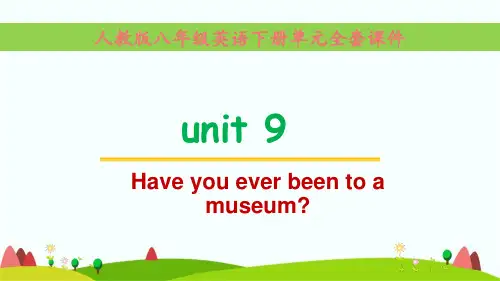
Jone has never been to the space museum. TF
They are going to take the subwayrt museum ___1__ water park __4___
zoo __6___
amusement park _5____
1b
Listen. Have these students ever been to these places? Check (✓) the boxes.
Science History Art Nature Space museum museum museum museum museum
ever been to. To remember the new words:amusement,
somewhere, camera,invention …
➢ Warming up How was your vacation? Where did you go?
I went to Shanghai last year. I have been to shanghai.
Check
使用说明:点击对应课时,就会 跳转到相应章节内容,方便使用。
人教版八年级英语下册
Unit 9
Have you ever been to a museum?
Section A 1a-2d
➢ Objectives
To learn to talk about past experiences. To learn where Claudia and Sarah have
2. Claudia: I _h_a_v_e_b_e_e_n__t_o__ the art museum many times.
They are going to take the subwayrt museum ___1__ water park __4___
zoo __6___
amusement park _5____
1b
Listen. Have these students ever been to these places? Check (✓) the boxes.
Science History Art Nature Space museum museum museum museum museum
ever been to. To remember the new words:amusement,
somewhere, camera,invention …
➢ Warming up How was your vacation? Where did you go?
I went to Shanghai last year. I have been to shanghai.
Check
使用说明:点击对应课时,就会 跳转到相应章节内容,方便使用。
人教版八年级英语下册
Unit 9
Have you ever been to a museum?
Section A 1a-2d
➢ Objectives
To learn to talk about past experiences. To learn where Claudia and Sarah have
2. Claudia: I _h_a_v_e_b_e_e_n__t_o__ the art museum many times.
Unit9 Section A Gramm Focus课件2021-2022学年人教版英语八年级下册
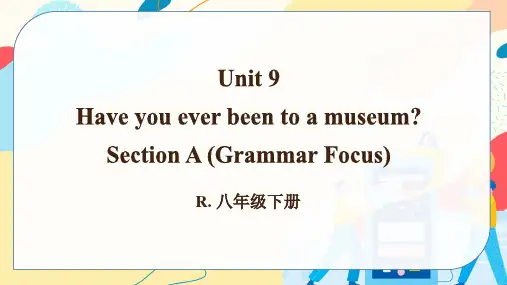
with Jane. A: How about your sister? B: She’s taking a shower right now because
she (2) _h_a_s__b_e_e_n_t_othe gym (健身房).
A: I (3)h_a_v_e__b_e_en__t_o the gym twice this week. It’s really tiring.
—Yes, I have been there once.
A. Have; gone B. Have; been
C. Do; go
D. Were; going
新疆乌鲁木齐中考
3.My friend’s new restaurant in Wanda Plaza (万达广 场) ______ two years ago, but I ______ there so far.
have been in+组织,表示加入某组织。 eg: He has been in the army for 3 years. 他参军三年了。
have been+adj./n.呈现……状态 eg: The shop has been open for 10 years. 这家店营业十年了。 We have been friends since we were 5. 我们从5岁起就一直是朋友。h
Language points
1. Well, I’ve already been there a couple of times, but I’m happy to go again.(教材P68 4a) a couple of 两个;一对;几个
a couple of 后跟可数名词复数。a couple of... 作主语时, 谓语动词用复数形式。 ➢ There are a couple of shoes in my bedroom, but they
she (2) _h_a_s__b_e_e_n_t_othe gym (健身房).
A: I (3)h_a_v_e__b_e_en__t_o the gym twice this week. It’s really tiring.
—Yes, I have been there once.
A. Have; gone B. Have; been
C. Do; go
D. Were; going
新疆乌鲁木齐中考
3.My friend’s new restaurant in Wanda Plaza (万达广 场) ______ two years ago, but I ______ there so far.
have been in+组织,表示加入某组织。 eg: He has been in the army for 3 years. 他参军三年了。
have been+adj./n.呈现……状态 eg: The shop has been open for 10 years. 这家店营业十年了。 We have been friends since we were 5. 我们从5岁起就一直是朋友。h
Language points
1. Well, I’ve already been there a couple of times, but I’m happy to go again.(教材P68 4a) a couple of 两个;一对;几个
a couple of 后跟可数名词复数。a couple of... 作主语时, 谓语动词用复数形式。 ➢ There are a couple of shoes in my bedroom, but they
人教版英语八年级下册Unit 9 - Section B教材全解知识点课件
Unit 9
上课时间: 老师:
1b
• For thousands of tourists from China, this small island in Southeast Asia is a wonderful and safe place to take a holiday. (1)thousands of意为“数以千计的;许许多多的“ thousand数词,意为“一千”,当表示一个确切的数目时, thousand前面有具体数字,其后不加-s,不和of连用 若表示一个不确切的数目,thousand前面没有具体数字, 其后要加-,且与of连用。 Thousands of tourists come to visit the Great wall everyday. There are about six thousand students in our school.
2b
• For thousands of tourists from China, this small island in Southeast Asia is a wonderful and safe place to take a holiday. (1)thousands of意为“数以千计的;许许多多的“
a half 二分之一
one sixth六分之一
two thirds 三分之二
2b
• On the one hand, more than three quarters of the population are Chinese , so you can simply speak Putonghua a lot of the time. On the other hand, Singapore is an English-speaking country, so it's also a good place to practice your English ! (2)three quarters意为“四分之 三”,其中quarter用作可数名词,意 为“四分之……” [拓展]分数作主语时,谓语动词的单复数一般要与分数后面的名词 的数保持致。若名词为可数名词复数形式,谓语动词用复数形式; 若名词为可数名词单数形式或不可数名词,谓语动词用第三人称 单数形式。
上课时间: 老师:
1b
• For thousands of tourists from China, this small island in Southeast Asia is a wonderful and safe place to take a holiday. (1)thousands of意为“数以千计的;许许多多的“ thousand数词,意为“一千”,当表示一个确切的数目时, thousand前面有具体数字,其后不加-s,不和of连用 若表示一个不确切的数目,thousand前面没有具体数字, 其后要加-,且与of连用。 Thousands of tourists come to visit the Great wall everyday. There are about six thousand students in our school.
2b
• For thousands of tourists from China, this small island in Southeast Asia is a wonderful and safe place to take a holiday. (1)thousands of意为“数以千计的;许许多多的“
a half 二分之一
one sixth六分之一
two thirds 三分之二
2b
• On the one hand, more than three quarters of the population are Chinese , so you can simply speak Putonghua a lot of the time. On the other hand, Singapore is an English-speaking country, so it's also a good place to practice your English ! (2)three quarters意为“四分之 三”,其中quarter用作可数名词,意 为“四分之……” [拓展]分数作主语时,谓语动词的单复数一般要与分数后面的名词 的数保持致。若名词为可数名词复数形式,谓语动词用复数形式; 若名词为可数名词单数形式或不可数名词,谓语动词用第三人称 单数形式。
人教版八年级英语下 Unit 9 Section B (1a-2e) 课件
__✓__ Have you seen the Terracotta
Army?
1c
Listen again and take notes.
Name: ____________P_e_t_e_r______________ Country: _______A_u_s_t_r_a_l_i_a_____________ How long in China: ___t_w_o__w_e_e_k_s_________ Places visited:t_h_e_P_a_l_a_c_e__M_u_s_e_u_m_,________ he G_r_e_at__W_a_l_l_,__t_h_e_B_i_r_d_’_s__N_es_t_,__t_he__T_e_r_ra_c_o_t_ta_ Arm Food: _________B_e_i_j_i_n_g__D_u_c_k___________
To learn new words: thousand, safe, simply, fear, whether, Indian, Japanese, fox, whenever, spring, mostly…
温故知 新
Complete the sentences. 1. 她已经去火车站接她朋友了。
Shheas__g_on_e___ to the train station to
meet her friend. 2. 谢谢你所做的一切。 have done
Thanks for all that you ____
3. 我很久没有看到你了。
Iha_v_e_n_’__t_ ____ you for a long tsiemeen.
you'll find a lot of food from China; you wont have any problem getting rice, n精o彩o的dl,e优s秀o的r dumplings. Singapore is also an excellent place to try new food. Whether you like Indian foo也d许,你W会es担t心er人n在国外 food or Japanese food, you’找不ll到可fi以n吃d的i东t西。
Army?
1c
Listen again and take notes.
Name: ____________P_e_t_e_r______________ Country: _______A_u_s_t_r_a_l_i_a_____________ How long in China: ___t_w_o__w_e_e_k_s_________ Places visited:t_h_e_P_a_l_a_c_e__M_u_s_e_u_m_,________ he G_r_e_at__W_a_l_l_,__t_h_e_B_i_r_d_’_s__N_es_t_,__t_he__T_e_r_ra_c_o_t_ta_ Arm Food: _________B_e_i_j_i_n_g__D_u_c_k___________
To learn new words: thousand, safe, simply, fear, whether, Indian, Japanese, fox, whenever, spring, mostly…
温故知 新
Complete the sentences. 1. 她已经去火车站接她朋友了。
Shheas__g_on_e___ to the train station to
meet her friend. 2. 谢谢你所做的一切。 have done
Thanks for all that you ____
3. 我很久没有看到你了。
Iha_v_e_n_’__t_ ____ you for a long tsiemeen.
you'll find a lot of food from China; you wont have any problem getting rice, n精o彩o的dl,e优s秀o的r dumplings. Singapore is also an excellent place to try new food. Whether you like Indian foo也d许,你W会es担t心er人n在国外 food or Japanese food, you’找不ll到可fi以n吃d的i东t西。
新人教版英语八年级下册Unit9单元总复习省公开课获奖课件说课比赛一等奖课件
在夜晚 一年到头;终年
离……远 在黑暗中 在过去 去过某地
去不同旳地方 坐地铁 搭帐篷 多种各样旳
11. encourage sb. to do sth.
鼓励某人做某事
12. on the one hand... on the other hand.
一方面,另一方面
13. thousands of
B. also
C. either
D. neither
2. ______ people have lost their lives in this earthquake.
A. Thousands
B. Thousand of
C. Thousands of
D. Ten thousands
句型大闯关
3. _____ you like swimming, fishing _____ boating, you’ll
now等。 I have seen her before, but I can not remember where.
语法加油站
2. 三大句式旳使用方法区 别:
使用方法
例句
have/has been to 强调“去过”某地,人已经 I have been to Shanghai twice. 回来,背面可接表达次数旳 我去过上海两次。
语法加油站
单项选择。
1. — I’d like to introduce my best friend to you, Peter.
— Thank you, Lucy. But we __D___ already.
A. meet B. met C. will meet D. have met
Unit9 Section A (Grammar Focus -4c)课件 人教版八年级下册英语
adj. 德国的;德语的;德国人的 n. 德语;德国人
There are some special German paintings there right now.
B: Sure. When do you want __t_o_g_o__ (go) ?
5. A: Have you ever __v_i_si_t_e_d__ (visit) the history museum?
the space museum?
No, I haven’t.
I’ve been to the art Me, too. And I’ve also visited the
museum many times.
nature museum.
I’ve never been to a water park.
Me neither.
现在完成时(Ⅱ) 现在完成时表示经历的用法
现在完成时常用have been to (去过), ever (曾经),never (从没)等表示经历。
现在完成时(二)
一、现在完成时中的 ever 和 never ① ever 的含义及用法
ever 作副词,意为“曾经”,常用于现在完成时的否定句和 疑问句中,位于助动词 have/has 之后、过去分词之前。 ➢Have you ever seen anything like it? 你曾见过像它这样的东西吗? ➢I don't think I have ever been here before. 我觉得我以前从未到过这里。
2.许多次______m__a_n_y__t_im__e_s________________
3.自然博物馆___n__a_t_u_r_e_m__u_s_e_u_m_______________ 4.在科技馆_____a_t__th__e_s_c_i_e_n_c_e_m__u_s_e_u_m______ 5.上个周末_____la_s_t_w__e_e_k_e_n_d__________________ 6.在动物园____a_t_t_h_e__z_o_o__________________ 7.令人兴奋的供乘骑的游乐设施__m__a_n_y__e_x_c_it_i_n_g__ri_d_e_s_ 8.立刻;马上_______r_i_g_h_t__n_o_w_/_a_t_o__n_c_e_____ 9.我也没有___m__e__n_e_i_th_e_r_____________________ 10.一个特别的主题_a__s_p_e_c_i_a_l_t_h_e_m__e________ 11.听说__h_e_a__r_o_f____________________________
There are some special German paintings there right now.
B: Sure. When do you want __t_o_g_o__ (go) ?
5. A: Have you ever __v_i_si_t_e_d__ (visit) the history museum?
the space museum?
No, I haven’t.
I’ve been to the art Me, too. And I’ve also visited the
museum many times.
nature museum.
I’ve never been to a water park.
Me neither.
现在完成时(Ⅱ) 现在完成时表示经历的用法
现在完成时常用have been to (去过), ever (曾经),never (从没)等表示经历。
现在完成时(二)
一、现在完成时中的 ever 和 never ① ever 的含义及用法
ever 作副词,意为“曾经”,常用于现在完成时的否定句和 疑问句中,位于助动词 have/has 之后、过去分词之前。 ➢Have you ever seen anything like it? 你曾见过像它这样的东西吗? ➢I don't think I have ever been here before. 我觉得我以前从未到过这里。
2.许多次______m__a_n_y__t_im__e_s________________
3.自然博物馆___n__a_t_u_r_e_m__u_s_e_u_m_______________ 4.在科技馆_____a_t__th__e_s_c_i_e_n_c_e_m__u_s_e_u_m______ 5.上个周末_____la_s_t_w__e_e_k_e_n_d__________________ 6.在动物园____a_t_t_h_e__z_o_o__________________ 7.令人兴奋的供乘骑的游乐设施__m__a_n_y__e_x_c_it_i_n_g__ri_d_e_s_ 8.立刻;马上_______r_i_g_h_t__n_o_w_/_a_t_o__n_c_e_____ 9.我也没有___m__e__n_e_i_th_e_r_____________________ 10.一个特别的主题_a__s_p_e_c_i_a_l_t_h_e_m__e________ 11.听说__h_e_a__r_o_f____________________________
- 1、下载文档前请自行甄别文档内容的完整性,平台不提供额外的编辑、内容补充、找答案等附加服务。
- 2、"仅部分预览"的文档,不可在线预览部分如存在完整性等问题,可反馈申请退款(可完整预览的文档不适用该条件!)。
- 3、如文档侵犯您的权益,请联系客服反馈,我们会尽快为您处理(人工客服工作时间:9:00-18:30)。
museum? B: No, I haven’t. How about you? A: …
Listening 2
2a Look at the map of the town. Listen and circle the places you hear.
Listening 2 2b Listen again and circle T for true or F
1. space museum 2. amusement park 3. water park 4. camera n.
1. 太空博物馆 2. 游乐场 3. 水上乐园 4. 照相机;摄影
机;摄像机
space museum Have you ever been to a space museum?
2d Role-play the conversation.
Yes, I have. I went there back
in April. …
I went to the film museum last weekend.
Have you ever been there? …
1. I learned about the inventions that led to color movies, too. 我还了解了一 些发明,它们成就了彩色电影。 此处learn是“了解;获知;得知”的 意思,由介词about或of引入所获知的 具体内容。例如:
2c Look at the map in 2a and make conversations about the places.
A: Have you ever been to the space museum?
B: Yes, I have. How abo极ut 好you的?
A: No, I haven’t. B: Oh, it’s fantastic. Let’s go tomorrow. A: OK. How are we going to get there? B: We can take the subway.
history museum Have you ever been to a history museum?
art museum Have you ever been to an art museum?
water park Have you ever been to a water park?
two speakers? A. Friends B. Teacher and student C. Mother and kid.
1b Listening 1
Listen. Have these students ever been to these places? Check (√) the boxes.
1.When did Sarah visit the National Science Museum?
2.A. Today B. Yesterday C. Last year 3.2. When did Claudia visit the nature museum? A. Last year B. Last summer B.C. Last school trip 3. What may the relationship be between the
space museum____ history museum____
art museum ____ water park ____
zoo ____
amusement park ____
Talk something about the picture.
Sarah
Claudia
Listening 1 Choose the best answer.
for false. Conversation 1
1. Tina went to the space museum last year. T/F 2. John has never been to the space museum. T/F 3. They are going to take the subway. T/F
Conversation 2 1. Linda has been to the amusement park. T/F 2. Linda went to the amusement park yesterday. T/F 3. Linda is going to the amusement park again by bike. T/F
Science History Art
Nature Space
museum museum museum museum museum
Claudia Sarah √
√
√
Байду номын сангаас
√
√
√
Ask and answer questions about the places in 1b.
A: Let’s go somewhere different today. B: OK. Where do you want to go? A: Have you ever been to the space
Conversation 3 1. Frank had a great time at the water park. T/F 2. Frank’s friend has never been to the water park. T/F 3. Frank and his friend are going skating. T/F
zoo Have you ever been to a zoo?
amusement park
Have you ever been to an amusement park?
A: Have you ever been to…? B: Yes, I have./ No, I haven’t.
1a Which of these places would you like to visit? Rank them from 1(most) to 6 (least).
Listening 2
2a Look at the map of the town. Listen and circle the places you hear.
Listening 2 2b Listen again and circle T for true or F
1. space museum 2. amusement park 3. water park 4. camera n.
1. 太空博物馆 2. 游乐场 3. 水上乐园 4. 照相机;摄影
机;摄像机
space museum Have you ever been to a space museum?
2d Role-play the conversation.
Yes, I have. I went there back
in April. …
I went to the film museum last weekend.
Have you ever been there? …
1. I learned about the inventions that led to color movies, too. 我还了解了一 些发明,它们成就了彩色电影。 此处learn是“了解;获知;得知”的 意思,由介词about或of引入所获知的 具体内容。例如:
2c Look at the map in 2a and make conversations about the places.
A: Have you ever been to the space museum?
B: Yes, I have. How abo极ut 好you的?
A: No, I haven’t. B: Oh, it’s fantastic. Let’s go tomorrow. A: OK. How are we going to get there? B: We can take the subway.
history museum Have you ever been to a history museum?
art museum Have you ever been to an art museum?
water park Have you ever been to a water park?
two speakers? A. Friends B. Teacher and student C. Mother and kid.
1b Listening 1
Listen. Have these students ever been to these places? Check (√) the boxes.
1.When did Sarah visit the National Science Museum?
2.A. Today B. Yesterday C. Last year 3.2. When did Claudia visit the nature museum? A. Last year B. Last summer B.C. Last school trip 3. What may the relationship be between the
space museum____ history museum____
art museum ____ water park ____
zoo ____
amusement park ____
Talk something about the picture.
Sarah
Claudia
Listening 1 Choose the best answer.
for false. Conversation 1
1. Tina went to the space museum last year. T/F 2. John has never been to the space museum. T/F 3. They are going to take the subway. T/F
Conversation 2 1. Linda has been to the amusement park. T/F 2. Linda went to the amusement park yesterday. T/F 3. Linda is going to the amusement park again by bike. T/F
Science History Art
Nature Space
museum museum museum museum museum
Claudia Sarah √
√
√
Байду номын сангаас
√
√
√
Ask and answer questions about the places in 1b.
A: Let’s go somewhere different today. B: OK. Where do you want to go? A: Have you ever been to the space
Conversation 3 1. Frank had a great time at the water park. T/F 2. Frank’s friend has never been to the water park. T/F 3. Frank and his friend are going skating. T/F
zoo Have you ever been to a zoo?
amusement park
Have you ever been to an amusement park?
A: Have you ever been to…? B: Yes, I have./ No, I haven’t.
1a Which of these places would you like to visit? Rank them from 1(most) to 6 (least).
